PART 1
do tenants have rights?

Jarvis Street is lined with different types of residential buildings including townhouses, shelters, co-ops, condos and rental apartments.


SAHAANA RANGANATHAN
Toronto Metropolitan University Master of Journalism graduate with a passion for community-based storytelling. Currently living in the Annex. Always down to get matcha or milk tea.
Jan. 6, 2025
In September 2024, The Green Line received an email asking questions about renting and evictions.
That’s when I realized I knew absolutely nothing about my tenant rights.
What do you do if you get an eviction notice? Do you need to move if your landlord sells your place?
I called everyone I know, I went to the internet and I spoke to experts. I did everything to understand how to deal with one of the most stressful scenarios for any Torontonian: evictions.
This led me to the Residential Tenancies Act, also known as the RTA. The RTA is the governing legislation that determines the rights and responsibilities of tenants and landlords across Ontario.
"An express purpose in the legislation is the protection of tenant rights and also a recognition of the inherent power dynamic, or power imbalance, between landlords and tenants," says Rosalea Thomson, a litigation lawyer at the Advocacy Centre for Tenants Ontario (ACTO).
Do you want to know if you're covered under the Residential Tenancies Act?
We break down who is covered by the RTA, why a tenant can be evicted and what the obligations and rights of all parties are in the video below.
Do you want to read more about tenant rights? Or maybe you want to check out tipsheets and hotlines to navigate facing an eviction? We've compiled a list of useful resources.
PART 2
BREAKING DOWN COMMON EVICTION SCENARIOS IN TORONTO

SAHAANA RANGANATHAN
Toronto Metropolitan University Master of Journalism graduate with a passion for community-based storytelling. Currently living in the Annex. Always down to get matcha or milk tea.
Jan. 13, 2025
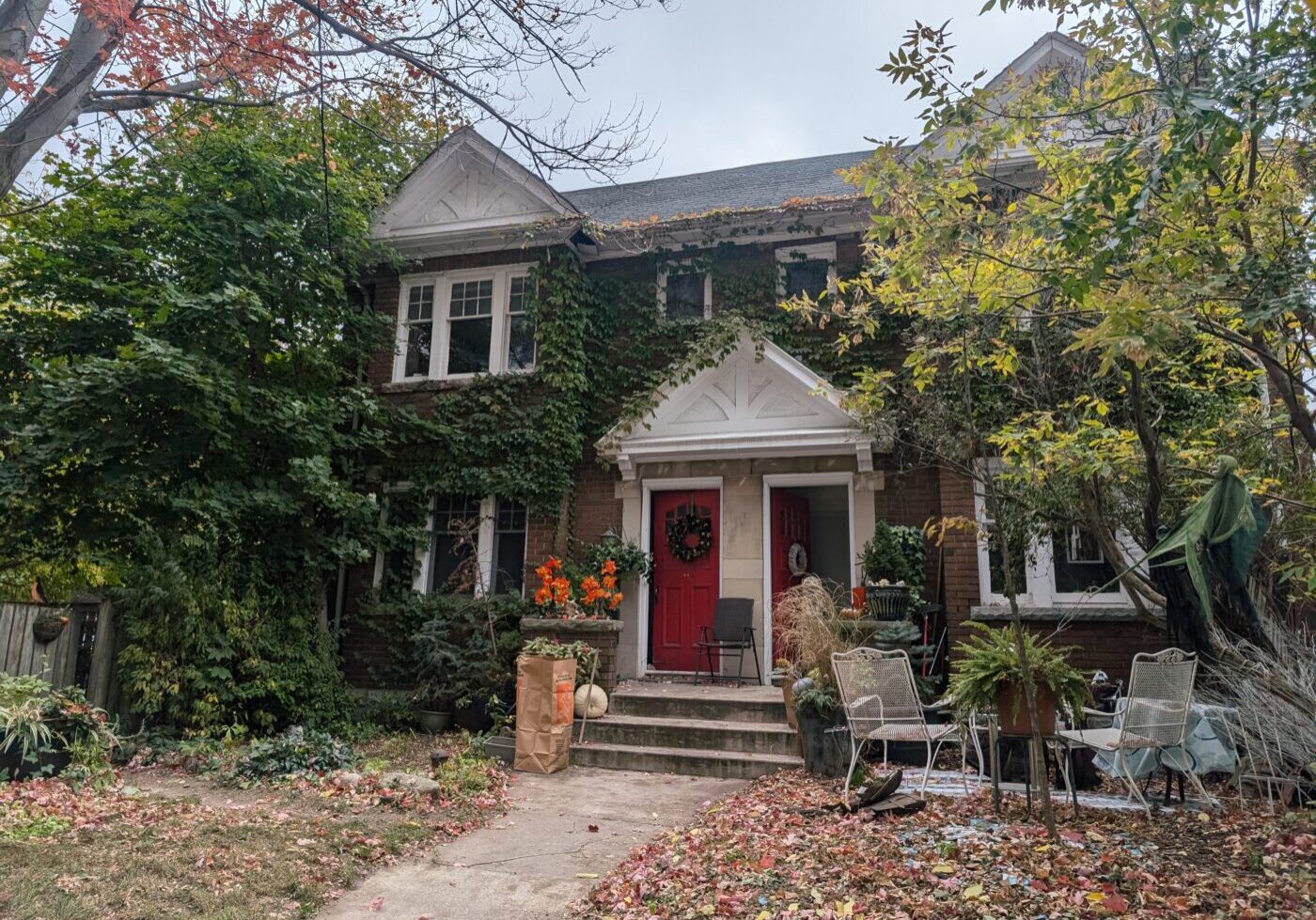
The Chois have been living in their home for over 40 years. In 2023, they were notified that they might be evicted because the building was set to be demolished.

When nearly half of Torontonians rent their homes, the possibility of getting evicted is destabilizing and overwhelming for many.
According to research by the Advocacy Center for Tenants Ontario, 42 per cent of Ontario renters have either been evicted themselves or have a friend or a close family member who has been evicted in the last 10 years.
Since 2020, own-use evictions — which are when a landlord files an N12 form because they want to move into or sell a tenant’s unit — rose by 85 per cent with a total of 6,376 cases in 2023 alone, according to data from the Landlord and Tenant Board (LTB).
So, the fear of receiving an eviction notice is real. But the stress doesn’t end there. Evictions can have long-lasting consequences. Tenants who experience evictions usually end up in lower quality housing in neighbourhoods with less infrastructure and amenities, according to a study by the Canadian Centre for Housing Rights.
In light of these statistics, it's important to understand tenant rights and the eviction process in order to protect yourself.
That’s what Miso Choi and her family learned when they found out that their building manager is planning on demolishing their home.
“It was absolutely terrifying,” Choi says. “I'm a super anxious person; so for me, my response was like: okay, what can we do now? I need to find out more information. I need to get organised and notify the city and do all that sort of stuff.”
So, Choi leaped into action and began organizing with her neighbours, forming the Hillsdale-Manor Tenants Association. They are currently proceeding to a hearing at the Ontario Land Tribunal.
Groups like the Hillsdale-Manor Tenant Association help tenants collectively advocate for their rights.
The Federation of Metro Tenants Association (FMTA) is another organization that can help tenants who don’t have their own local association. FMTA organizes workshops to inform people about their rights and campaigns to advocate for tenants.
According to Lily Xia from FMTA, one big mistake tenants make is relying too heavily on the Landlord and Tenant Board, which is the tribunal where landlord-tenant disputes are resolved, to uphold their rights.
“If you can do stuff outside of the Landlord and Tenant Board, talk to your neighbours, figure out what's going on, try to collect more evidence and maybe try to pressure your landlord outside of the Landlord and Tenant Board to drop the eviction notices...those do have a bigger impact on preventing eviction than just relying on the Landlord and Tenant Board,” Xia says.
In The Green Line’s eviction video series, we share tip sheets and information from experts and tenants to help anyone navigate different eviction scenarios.
If you receive an eviction notice, this is the place to start.
What happens After you get an eviction notice?
Did you know that you don't need to move out immediately when you get eviction notice? There's still a long legal process ahead and you have the chance to defend your tenancy.

To evict a tenant, a landlord has to file a legal form through the Landlord and Tenand Board or LTB.

Receiving an eviction notice can be devastating. But it's usually only the first step in a long legal process. It is important to understand what happens next so you can use all tools available to protect your rights.
"I think one of the main misconceptions that people have about evictions is that the eviction notice that they get is when they have to move out," says Lily Xia from the Federation of Metro Tenants Association also known as the FMTA.
"People have more rights than I think they realize they do."
dealing with N4s: when you're behind on rent
If a landlord is evicting because you're behind on rent, they will give you an N4 form. This guide will help you understand what happens next.

Residential buildings in Moss Park.

When you receive an N4 form because you're behind on rent, there will be a termination date. But, you do not need to move out by that date. The notice gives you 14 days to pay all the rent you owe and if you do, this will void the notice.
But sometimes, it's more complicated. If there's been a rental increase that the tenant thinks is illegal and they've been paying the old rent, the landlord can still file an N4, says Rosalea Thomson, a litigation lawyer at the Advocacy Centre for Tenants Ontario.
Has your rent gone up more than 2.5 per cent in the last year? That's considered an above the guideline increase (AGI) and you can fight back. We interviewed residents who successfully fought an AGI and made a checklist so you can do the same.
dealing with N12s: when your landlord wants to sell or move into your unit
A landlord cannot knock on a tenant's door and tell them to leave as soon as possible because they want to move in or sell the place.
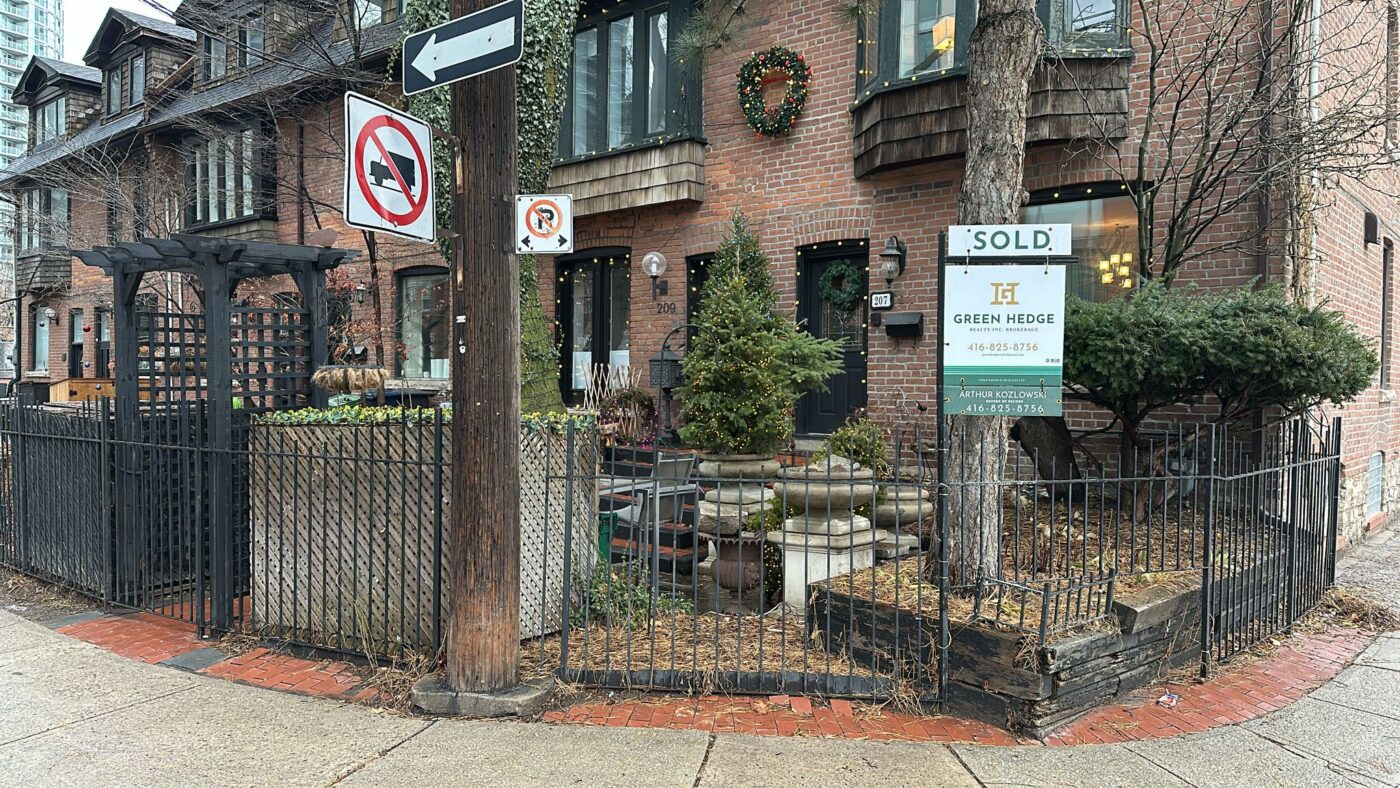
A house is sold on George Street.

When a landlord or their immediate family want to move into the unit you’re renting, or if they want to sell the property, they have to send you an N12 form with 60 days notice.
However, that is only the first step. If you chose to stay past the termination date, the landlord has to file an L2 form to the Landlord and Tenant Board (LTB). This prompts a hearing where you'll have a chance to defend your tenancy.
dealing with n13s: when your landlord wants to renovate or demolish your building
Demovictions and renovictions can be some of the most stressful scenarios for Torontonian renters. Thankfully, there are ways to advocate for your rights.

Miso Choi found out in 2023 that she might be evicted because her building was set to demolition. She jumped into action with her neighbours and formed the Hillsdale-Manor Tenant Association.

Last year, Miso Choi found out that the building where she lives — along with the adjacent building where her parents have lived for four decades — is set for demolition.
"It was absolutely terrifying," Choi told The Green Line. "For my entire family, we consider where we live our home. So the the thought of losing it is very emotional. It's upsetting and it's really destabilising."
Choi hasn’t received a formal eviction notice or N13 form yet but she and her neighbours are trying to fight it before the process begins.
Here's your chance to support the only independent, hyperlocal news outlet dedicated to serving gen Zs, millennials and other underserved communities in Toronto. Donate now to support The Green Line.
PART 3
HOW TO FIGHT YOUR LANDLORD
(AND ACTUALLY WIN)
A community dinner and Story Circle hosted by The Green Line.
About the Event
We’re partnering with St. Stephen-In-The-Fields church to host a community dinner and Story Circle in the Kensington-Chinatown neighbourhood on Tuesday, Jan. 21 from 6 to 9 p.m. We’ll be talking about how to navigate evictions and the resources that are available to deal with them.
Housing organizer Flynn Daunt of the Keele Area Tenants Committee is giving a step-by-step walkthrough on how they successfully fought eviction notices. We also have resource tables featuring the Oakwood Vaughan Community Organization (OVCO), the Federation of Metro Tenants' Associations (FMTA) and the Advocacy Centre for Tenants Ontario (ACTO).

Flynn Daunt is a community organizer and member of the Keele Area Tenants Committee. In 2020, facing down the threat of renoviciton he, alongside his neighbours, successfully resisted through organizing, demonstrations and collective action. They ultimately stopped the eviction and saved their building. Drawing from this experience, Flynn has since organized other buildings in the area, building a grassroots network of tenants to combat renovictions, rent increases, maintenance neglect and abuse from landlords.
Delicious catering will be provided by Lebanese Garden, so don’t miss out!
Our event is Pay What You Can, as we want to include as many Torontonians as possible in this conversation. For transparency, here's a breakdown of our costs:
- Venue rental: $50
- Food and drinks: $300
- Labour: $1,200
If you'd like to support our team in continuing to host community-focused events like this, we'd appreciate a contribution of $31 to help us fully cover operational costs. If this is above your budget, we'd appreciate a payment of $10. If that's still a barrier to you joining us, you can contribute as much as you're able (even $1!).
RSVP before spots fill up.
Events are an essential part of our Action Journey. We want to empower Torontonians to take action on the issues they learn about in The Green Line — so what better way to do that than by bringing people together? From community members to industry leaders, anyone in Toronto who’s invested in discussing and solving the problems explored in our features is invited to attend. All ages are welcome unless otherwise indicated. Our only guidelines? Be present. Listen. Be kind and courteous. Respect everyone’s privacy. Hate speech and bullying are absolutely not tolerated. At the end of the day, if you had fun and feel inspired after our events, then The Green Line team will have accomplished what we set out to do. Any questions? Contact Us.
PART 4
tenant tactics
to curb housing stress
Event Overview
See what you missed
from our latest event.
Our community members brainstormed solutions for dealing with evictions in Toronto.
Compiled by James Westman.
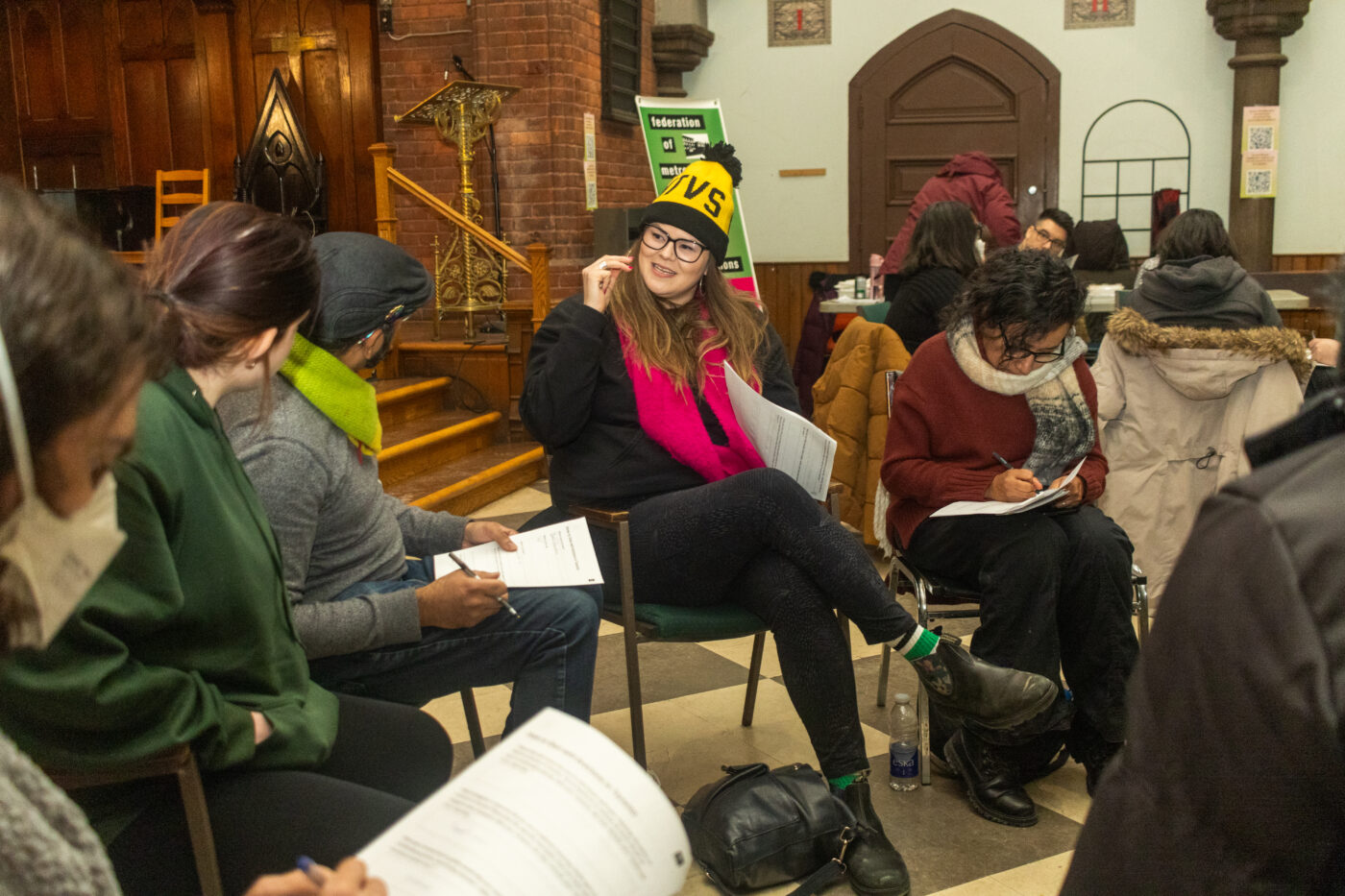
Event attendees talk about the issues they've faced with their landlords and how they navigated them during Story Circles.
📷 : Amartya Smaran/The Green Line.

Flynn Daunt of the Keele Area Tenants Committee gives a presentation about how he and his neighbours fought an eviction.
📷 : Amartya Smaran/The Green Line.

Event attendees talk about the issues they've faced with their landlords and how they navigated them during Story Circles.
📷 : Amartya Smaran/The Green Line.
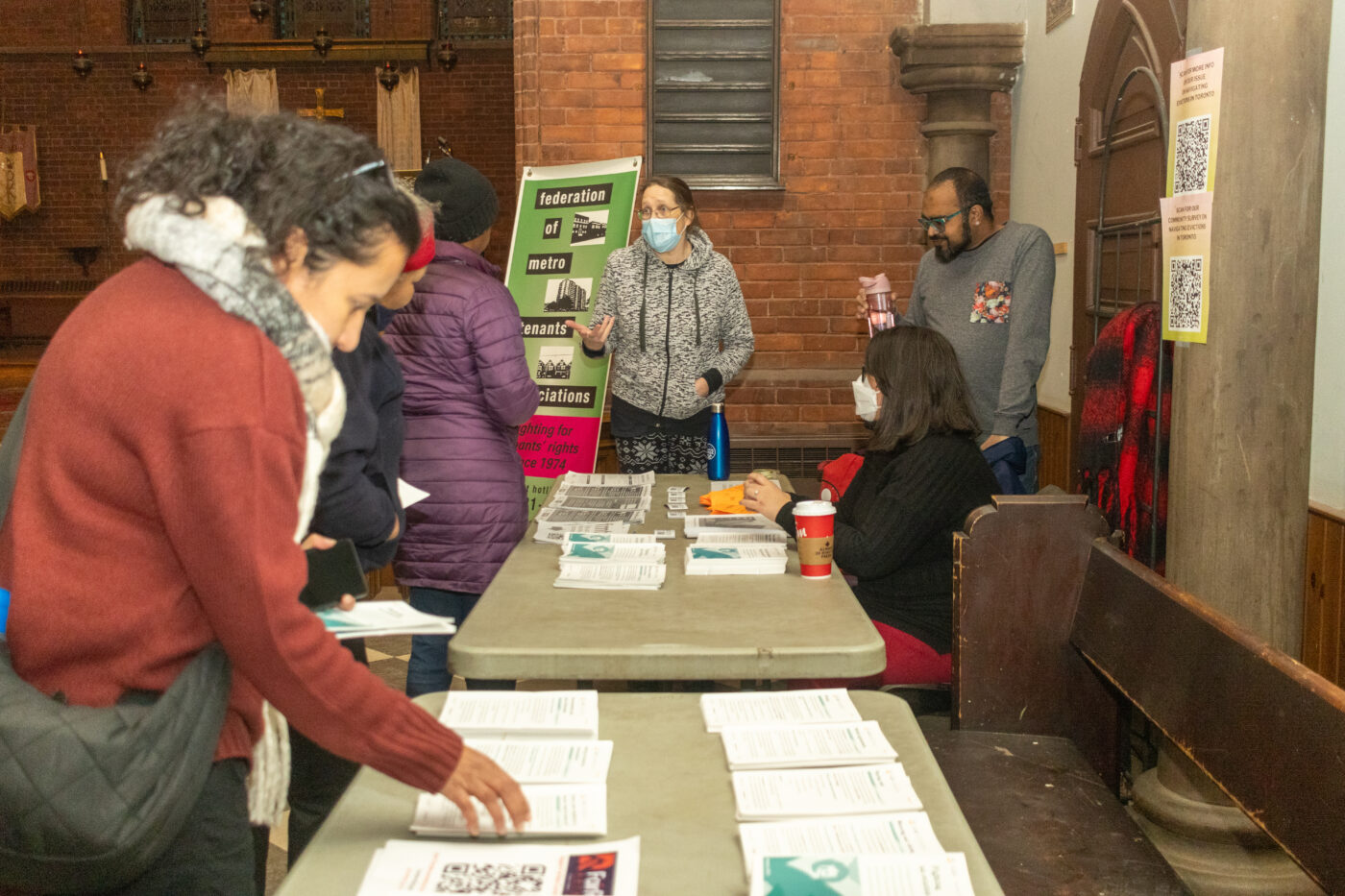
Attendees visit resources tables featuring the Oakwood Vaughan Community Organization (OVCO), the Federation of Metro Tenants' Associations (FMTA) and the Advocacy Centre for Tenants Ontario (ACTO) during our January Action Journey event.
📷 : Amartya Smaran/The Green Line.
SOLUTIONS
ACTIONS
Do something about the problems that
impact you and your communities.
Seek free legal advice
While many tenant organizations cannot offer legal advice, legal aid clinics can. Toronto’s legal aid clinics are organized based on different geographic units as well as specific marginalized groups. The City of Toronto’s map can help you determine which legal aid clinic to call. Be aware there can be wait times for accessing these services, so it is best to contact them right away.
Call a tenant hotline
The Federation of Metro Tenants Association (FMTA) runs a Tenant Infohub and Tenant Hotline. Renters in Toronto can call them on 416-921-9494 for free tenant's rights counseling services.
Appeal your eviction
If an eviction is ordered in your Landlord Tenant Board (LTB) hearing, you may be able to appeal your case to Ontario’s Divisional Court. To be successful, you will have to prove that the LTB misinterpreted the law, as they only hear matters of law and do not allow you to dispute facts of the case.
Join our community
Continue the conversation with other Green Line community members.
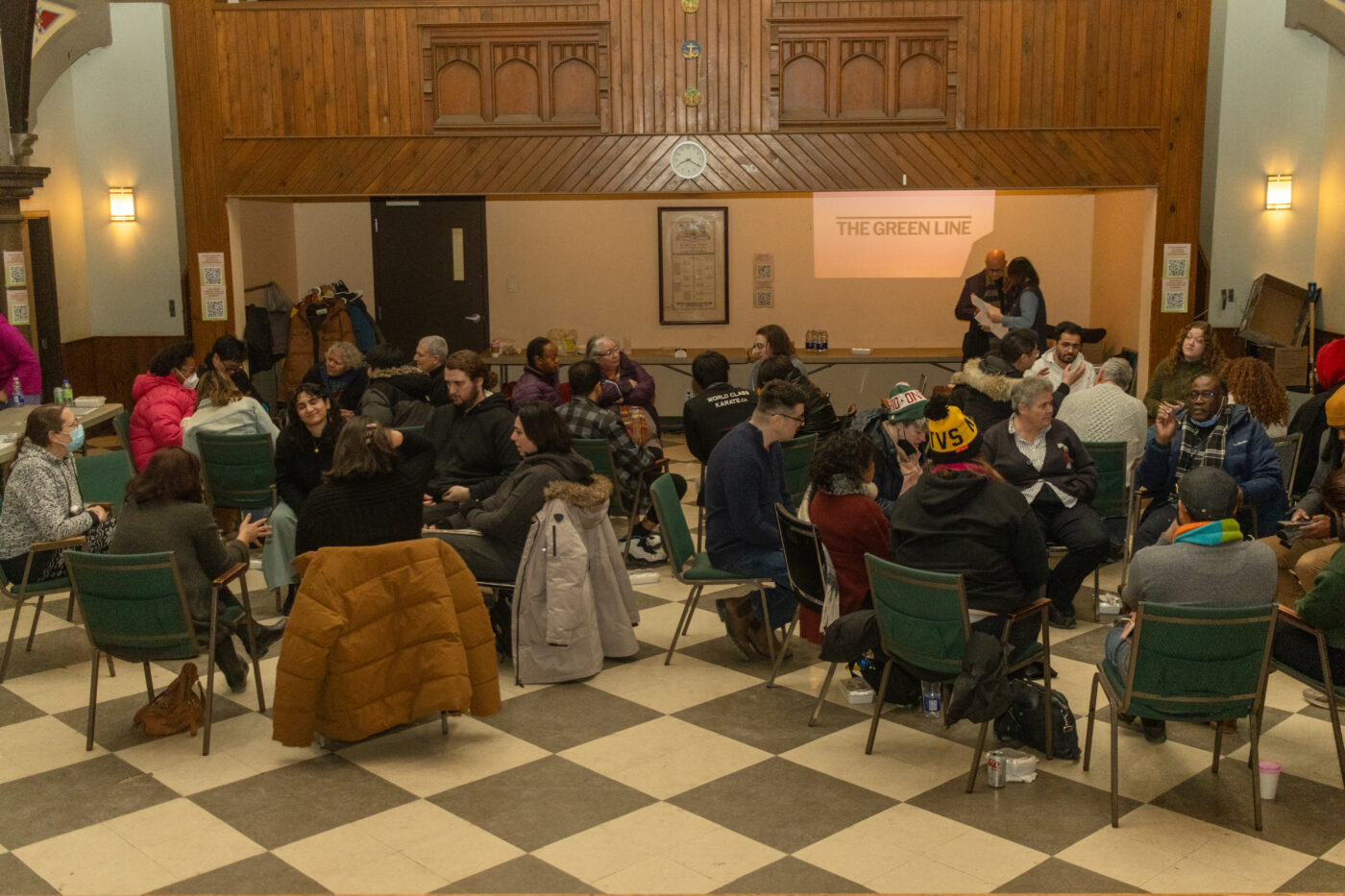
Event attendees talk about issues they faced with their landlords, and resources that helped them during our January Action Journey Story Circles at St. Stephens-In-The-Fields church.
📷: Amartya Smaran/The Green Line.
Become a Green Liner to get exclusive access to our events and meet a community of people who want to rewrite Toronto's identity together.

